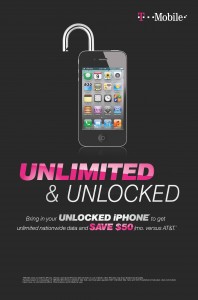 T-Mobile USA has been the odd man out when it comes to the iPhone, as it is one of the two major carriers to not offer the iPhone on an official level in the US along with regional carrier MetroPCS due to its 3G network being based around the less common AWS band, a band that has seen little in the way of international unlocked device support save for select devices from Samsung and Nokia apart from its carrier subsidized lineup. As a result of this, device selection for customers has been limited to carrier variants and exclusives that have attempted to blunt the effect of the iPhone’s popularity, with varying levels of success.
T-Mobile USA has been the odd man out when it comes to the iPhone, as it is one of the two major carriers to not offer the iPhone on an official level in the US along with regional carrier MetroPCS due to its 3G network being based around the less common AWS band, a band that has seen little in the way of international unlocked device support save for select devices from Samsung and Nokia apart from its carrier subsidized lineup. As a result of this, device selection for customers has been limited to carrier variants and exclusives that have attempted to blunt the effect of the iPhone’s popularity, with varying levels of success.
Now, in an act that tacitly admits the carrier’s failure to secure rights to sell a carrier compatible variant of the iPhone, T-Mobile will take the equally bold step of rolling out iPhone support on an official level in select markets beginning on Wednesday, with stores in Seattle, Las Vegas, Washington D.C. and New York being the first to demo the official network support for the iPhone and plans to expand the service to more markets as time goes on with the expansion of HSPA+ on the 1900MHz band, necessary for the iPhone to take advantage of T-Mobile’s 3G network. The support also includes the availability of T-Mobile specific apps related to account management and related network exclusive services.
The idea behind offering the service is simple, as the carrier heavily touts that it currently unofficially supports 1 million iPhone users on its network. It’s currently transitioning its 3G network to the 1900 band used for its GSM/EDGE service while it works to roll out LTE on its AWS band holdings previously earmarked for 3G service, which is a clear reversal of its previous plans and was forced after the higher than expected count of customers using an iPhone on its network. With T-Mobile also reviving unlimited data for postpaid customers, the combination is expected to draw in even more customers away from competitors.
For T-Mobile to offer iPhone support at an official level demonstrates how far the company is willing to go in order to remain viable as it continues to recover from the fallout of the failed AT&T purchase and merger, since the company has recorded continued postpaid customer losses and its once award-winning customer service has declined significantly in quality as a result of the previous focus on the merger. If T-Mobile can position both unlimited postpaid data and the iPhone support properly, the company can be a viable alternative to the current iPhone carriers in the US, as all but one also offer unlimited data access for iPhone users. Whether that’s enough to drive new users to T-Mobile remains to be seen.